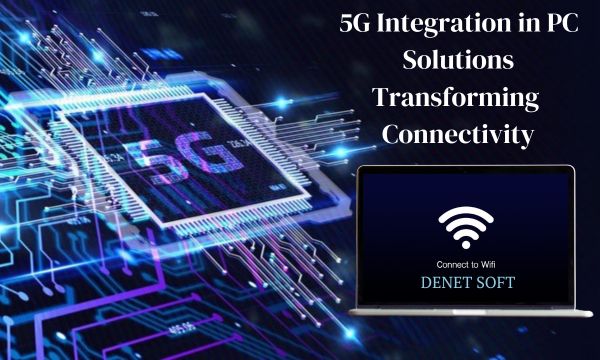“Ultra Compact Pc Exploring Space-Saving Solutions” In an era where living spaces are becoming smaller and more expensive. The need for compact and efficient computing solutions has never been greater. The tech industry has responded by pushing the boundaries of miniaturization, introducing a new generation of ultra-compact PCs that defy traditional size expectations.
Whether you’re a digital nomad seeking a portable workstation or a minimalist looking to declutter your workspace. These space-saving PCs are designed to provide powerful computing capabilities in a remarkably small footprint.
The Rise of Mini PCs
Mini PCs, also known as small form factor (SFF) PCs or ultra-small form factor (USFF) PCs, have been around for a while. But recent advancements in hardware integration and thermal management have enabled the creation of even smaller and more capable devices.
- Intel NUC (Next Unit of Computing): Intel’s NUC series, first introduced in 2012, has been a driving force behind the popularity of mini PCs. These compact devices, often measuring no larger than a small paperback book, pack impressive computing power into a sleek, modular design.
- Raspberry Pi: While not a full-fledged PC, the Raspberry Pi series of single-board computers has become a popular choice for hobbyists, tinkerers, and DIY enthusiasts. With a footprint smaller than a credit card and a wide range of use cases, Raspberry Pi devices offer an affordable and highly customizable computing solution.
Advanced Cooling Solutions
As components are packed into smaller spaces, thermal management becomes a critical challenge. Manufacturers have employed innovative cooling solutions to dissipate heat effectively and maintain optimal performance in these ultra-compact PCs.
- Passive Cooling: Some mini PCs, such as the Intel NUC and Raspberry Pi, rely on passive cooling methods like heat sinks and thermal pads to transfer heat away from critical components. These solutions are quiet, reliable, and offer a simplified design with fewer moving parts.
- Active Cooling with Optimized Airflow: More powerful mini PCs may incorporate small fans or blowers to actively circulate air over heat-generating components. These systems often feature optimized airflow paths and ducting to maximize cooling efficiency while minimizing noise levels.
- Integrated Heat Pipes: High-end ultra-compact PCs, like the Zotac ZBOX, employ advanced cooling solutions like copper vapor chambers and heat pipes. These systems transfer heat away from hot spots and distribute it across a larger surface area for efficient dissipation.
Modular and Upgradeable Designs
While ultra-compact PCs are small in stature, many offer modular designs that allow for future upgrades and customization. This flexibility ensures that users aren’t limited by their current hardware configuration and can adapt their systems to meet evolving needs.
- User-Replaceable Components: Mini PCs often feature removable panels or enclosures that provide easy access to RAM, storage, and even processors for upgrades or repairs. This modularity allows users to extend the lifespan of their devices and tailor their performance to specific workloads.
- Expansion Slots and External Ports: Despite their small size, many ultra-compact PCs offer expansion slots for adding additional storage, graphics cards, or other peripherals. They also typically include a generous selection of USB ports, display outputs, and networking interfaces to accommodate a wide range of peripherals and accessories.
Desktop-Class Performance in a Compact Package
The latest generation of ultra-compact PCs packs a surprising punch, delivering desktop-class performance in a tiny footprint. This level of power makes them suitable for a wide range of applications, from everyday productivity tasks to resource-intensive workloads like video editing and 3D rendering.
- High-End Desktop Processors: Mini PCs can be configured with the latest high-end desktop processors from Intel and AMD, such as the 12th Gen Intel Core i9 and AMD Ryzen 9 5000 series. These powerful CPUs provide multi-core performance and support advanced technologies like hyperthreading and overclocking.
- Dedicated Graphics: While integrated graphics have come a long way, demanding applications like gaming and content creation benefit from dedicated graphics cards. Many ultra-compact PCs support low-profile or small form factor GPUs, offering a significant performance boost over integrated solutions.
- High-Speed Storage: The latest ultra-compact PCs often feature PCIe 4.0 solid-state drives (SSDs) or even cutting-edge PCIe 5.0 SSDs, providing lightning-fast data transfer rates and responsiveness.
Versatility and Portability
One of the significant advantages of ultra-compact PCs is their versatility and portability. These systems can easily transition between various use cases, making them ideal for professionals who need to work in multiple locations or individuals looking for a single device to handle both work and entertainment needs.
- Portable Workstations: Compact PCs like the ZOTAC ZBOX and Gigabyte BRIX series are designed with portability in mind, often featuring carrying handles or compact form factors that can easily fit into a bag or backpack. These devices make perfect portable workstations for professionals who need to work on the go.
- Home Theater PCs (HTPCs): Mini PCs can also serve as powerful, yet unobtrusive. Home theater PCs (HTPCs), streaming high-quality media content to TVs or home theater setups. Their small size and quiet operation make them ideal for living room entertainment centers.
- Kiosks and Digital Signage: The compact nature of mini PCs, coupled with their ability to run 24/7, makes them well-suited for kiosks, digital signage, and other commercial applications that require a dedicated display system.
Future Trends: Pushing the Boundaries of Miniaturization
As technology continues to evolve, we can expect even smaller and more powerful ultra-compact PCs in the future. These advancements will be driven by ongoing improvements in hardware integration, cooling solutions, and power management.
- System-on-a-Chip (SoC) Integration: System-on-a-chip (SoC) designs, which integrate multiple components like the CPU, GPU, and memory onto a single chip, could enable further miniaturization while reducing power consumption and heat generation.
- Improved Cooling Techniques: Innovations in cooling technology, such as two-phase immersion cooling or advanced heat pipe designs, could pave the way for even higher-performance mini PCs that operate within a smaller thermal envelope.
- Renewable Energy Solutions: As ultra-compact PCs become more power-efficient, we may see the integration of renewable energy solutions like solar panels or miniature wind turbines to create self-powered, environmentally friendly computing systems.
Unique Tips and Tricks
- Invest in a compact wireless keyboard and mouse for a clutter-free workspace when using an ultra-compact PC.
- Utilize wall-mounting options or vertical stands to save desk space and create a minimalist setup.
- Consider upgrading the wireless network adapter to a faster, more reliable model if you experience connectivity issues or performance limitations.
- Use the low power consumption of mini PCs to your advantage by exploring battery-powered or solar-charged portable setups.
- Explore custom case mods and 3D-printed enclosures to personalize the look and functionality of your ultra-compact PC.
- Experiment with software solutions like remote desktop access or cloud gaming to offload intensive tasks to more powerful systems while retaining a compact local device.
Related Topic: Pc Health Monitoring
Frequently Asked Questions (FAQs)
Q: Can ultra-compact PCs handle demanding workloads like video editing or gaming?
Yes, many modern ultra-compact PCs can be configured with powerful processors, dedicated graphics, and high-speed storage, making them capable of handling demanding workloads typically associated with larger desktop systems.
Q: Are mini PCs suitable for everyday use?
Absolutely. Ultra-compact PCs are designed to be fully functional computing devices, capable of handling everyday tasks like web browsing, office productivity, media consumption, and more.
Q: Do mini PCs require special cooling considerations?
Yes, effective cooling is crucial for mini PCs to maintain optimal performance and prevent overheating. Look for models with well-designed passive cooling solutions or efficient active cooling systems.
Q: Can ultra-compact PCs be upgraded or repaired?
Many mini PCs offer modular designs that allow for component upgrades or replacements. However, some models may have limited upgrade potential due to their compact size and integrated components.
Conclusion
Ultra-compact PCs represent the cutting edge of space-saving computing solutions, combining impressive performance with a remarkably small footprint. As technology continues to push the boundaries of miniaturization, these devices will become even more powerful and versatile, enabling users to enjoy desktop-class computing capabilities in a compact, energy-efficient package. Whether you’re a digital nomad, a minimalist enthusiast, or a business seeking space-saving office solutions, ultra-compact PCs offer a compelling blend







